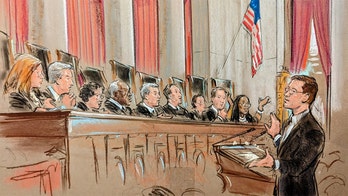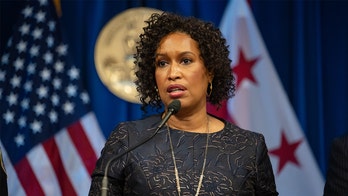Rick Santorum ensured that the Republican nominating battle will drag on, possibly into the spring and beyond, after pulling off a pair of victories in the Deep South on Tuesday -- as the presidential primary race passes the midway mark.
The former Pennsylvania senator edged out his opponents in both Mississippi and Alabama, allowing him to build the case that he is the "conservative" alternative to Mitt Romney over Newt Gingrich.
But even with two surprise wins, Santorum didn't walk away with a surge in delegates. As of Wednesday morning, Romney had 495 delegates to Santorum's 252. That's up from 454 and 217 before Tuesday's votes. Gingrich now stands with 131 delegates and Ron Paul with 48.
Romney did not go home empty handed because the states divide their delegates proportionally and he clinched a victory in the Hawaii caucuses by a wide margin. He took home 45 percent of the vote 52 percent of that state's delegates while Santorum trailed with 25 percent of the vote and 23 percent of the delegates.
Romney also won the small Republican caucus in American Samoa. He picked up all nine delegates in the contest in the U.S. territory located 2,300 miles south of Hawaii.
Romney political director Rich Beeson issued a memo Wednesday saying that while Santorum "is taking a victory lap" his odds of getting the nomination have in fact gotten worse.
"Tuesday's results actually increased Governor Romney's delegate lead, while his opponents only moved closer to their date of mathematical elimination," Beeson wrote. "The math is simple. ... Santorum and Gingrich now trail Governor Romney by margins they cannot mathematically make up. ... In order to win, both Santorum and Gingrich need to start netting an impossible number of delegates to overtake Governor Romney."
With no multi-state primary nights on tap until April 3 -- when D.C., Maryland and Wisconsin vote -- for the rest of the month the candidates will be competing for delegates one state or territory at a time in Missouri, Puerto Rico, Illinois and Louisiana.
With Tuesday's contests done, the Republican candidates are now at roughly the halfway point in the nominating battle. Twenty-four states, as well as the District of Columbia and Puerto Rico, still have to hold their primaries and caucuses.
The next contest up is the Missouri caucuses. Santorum, who won the state's nonbinding primary in February, said he hopes to do "even better” in the upcoming caucuses this weekend. He also left for Puerto Rico right after his Tuesday night remarks.
Santorum on Tuesday won in two deep red states that are among the most conservative in the nation. In his victory speech, Santorum suggested the GOP contest remains far more competitive than Romney's supporters make it out to be.
"We will compete everywhere. The time is now for conservatives to pull together," Santorum said.
Gingrich, meanwhile, was taking the long view. Though his campaign was banking on wins in Tuesday's contests, the former House speaker said he's staying in the race.
Asked which states he can still win, Gingrich told Fox News: "I don’t know yet."
But he contended there are "lots of places” where he can compete, like Delaware, Maryland and West Virginia.
In Mississippi, Gingrich finished second, just ahead of Romney. With nearly all precincts reporting, Santorum was leading with 33 percent of the vote. Gingrich was behind with 31 percent, followed by Romney with 30 percent.
Gingrich and Romney are still battling for second place in Alabama. With 99 percent reporting, Santorum was ahead with 35 percent -- followed by Gingrich with 29 percent and Romney with 29 percent.
Ron Paul is a distant fourth in both states.
Santorum's wins allow the candidate to increase the pressure on Gingrich to bow out of the race. The two primary contests Tuesday were considered crucial to the former House speaker's Southern strategy, and Santorum in the run-up to the vote had suggested it was time for Gingrich to exit. So far, the former speaker has won just two contests, in Georgia last week and South Carolina in January.
"It's very, very clear that outside of Speaker Gingrich's backyard, if you will, we're the candidate who's taking it to Mitt Romney," Santorum told Fox News. He told Fox News earlier in the day that conservative voters "have pretty much made a decision," claiming Gingrich is probably not "in the mix for getting the nomination at this point."
But Gingrich told Fox News before the results came in that he will not step aside. Talking to supporters Tuesday night in Alabama, Gingrich made clear he intends to stay in it.
"One of the things tonight proved is that the elite media's effort to convince the nation that Mitt Romney is inevitable just collapsed," Gingrich said. "The fact is in both states, the conservative candidates got nearly 70 percent of the vote. And ... if you're the front-runner and you keep coming in third, you're not much of a front-runner."
Gingrich said his campaign stands out for its emphasis on "substance" and big ideas, and he vowed to fight "all the way to Tampa" to compete for the nomination at the convention. He said his emphasis on gas prices already has changed the national debate, citing President Obama's recent focus on the issue.
As Santorum claims the mantle as the Non-Romney alternative, his campaign is still vying for the delegate push that brings him close to the front-runner. He was similarly frustrated over the weekend, after winning big in the Kansas caucuses -- only to watch Romney negate his delegate gains by picking off a few in Kansas and many more in under-the-radar contests held in various U.S. territories.
As of Wednesday morning, Santorum had gained 18 delegates in Alabama, Gingrich 12 and Romney 11. In Mississippi, Santorum snagged 13 delegates, and Gingrich and Romney tied with 12 each.
In Hawaii, Romney led with nine delegates, Santorum gained four and Ron Paul one.
Exit polls, as they have in prior races, showed Romney had done best among moderates on Tuesday. In exit polls out of Alabama, Santorum pocketed 41 percent among those who describe themselves as very conservative. Gingrich pulled 36 percent among that group.
In the same state, Santorum led among evangelicals, followed closely by Gingrich. But Romney far outpaced his competitors on the question of who is most electable against Obama -- 46 percent chose Romney, while less than a quarter said the same for Santorum or Gingrich. Three percent thought Paul was most electable.
Romney did not address supporters Tuesday night but made clear beforehand that he doesn't consider the Southern contests to be must-win for his nomination chances.
"John McCain didn't win either of these states, Alabama or Mississippi," he told Fox News. "We are delighted that we are doing so well there. The polls are suggesting it is kind of a three-way tie. It is an away game for me."
The Associated Press contributed to this report.





